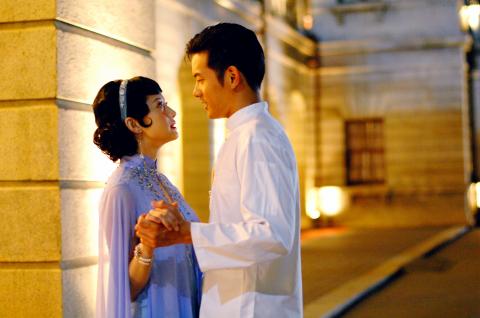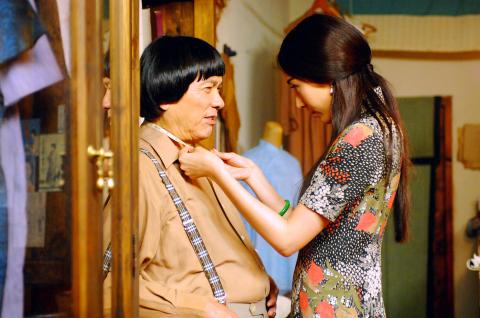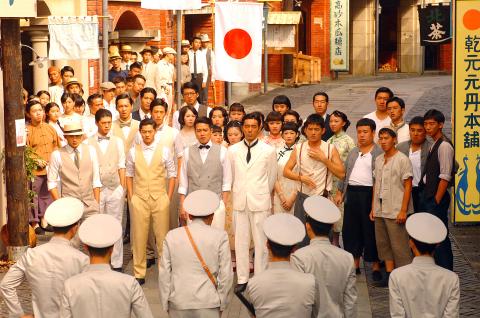After his feature debut Night Market Hero (雞排英雄), which grossed NT$140 million in 2011, blockbuster maker Yeh Tien-lun (葉天倫) returns with Twa Tiu Tiann (大稻埕), a film that aims to be grander and much larger in scope. The movie mixes fantasy and history to tell the story of a young man travelling back in time to 1920s Taiwan which was then under Japanese colonial rule. It is a melodramatic comedy punctuated with big emotions, and through its well-rendered time-travel conceit, the film delivers a rare portrait of Taipei as a city with a long history, affording its residents time travel into the past when one could bump into Chiang Wei-shui (蔣渭水), an important figure in Taiwan’s resistance to Japanese colonial rule, while walking down a Dadaocheng (大稻埕) street.
The film opens in present-day Taipei, where college student Jack, played by television show host-turned-actor Chris Wang (宥勝), whiles away his days chasing girls and hanging out with friends. To the gang of young lads, the history lessons taught by Professor P (Chu Ko Liang, 豬哥亮) couldn’t be more different from their easygoing lifestyle.
One day, during a field trip to a museum in western Taipei’s Dadaocheng area, Jack notices a painting on display. It is Festival on South Street (南街殷賑), a painting of iconic Dihua Street (迪化街)) by Kuo Hsueh-hu (郭雪湖), a pioneer of modern art in Taiwan. Encouraged by Professor P, Jack takes a photograph of the work. Suddenly, everything in the painting comes to life, and Jack finds himself transported back to 1920s Dadaocheng, which at the time was a major trading hub for tea, textiles, herbal medicines and many other goods.

Photo Courtesy of Swallow Wings
Bewildered, Jack is taken in by Ginger (Sonia Sui, 隋棠), a sassy Manchu woman who fled to Taiwan after the Qing Dynasty crumbled and has since run a textile shop in the area. To his surprise, Jack finds among Ginger’s helpers his history professor, who discovered the painting’s portal back in time and has been returning to the past constantly to court Ginger.
Jack’s eagerness to return to the 21st century dissipates when he meets young Taiwanese geisha Rose (Jian Man-shu, 簡嫚書). While love blossoms between Jack and Rose, they befriend Chiang Wei-shui (Lee Li-jen, 李李仁) and are drawn into the campaign for democracy led by Chiang and other Taiwanese civil rights activists. Soon Jack, Professor P and their friends become involved in Chiang’s effort to petition the colonial government for the creation of an elected representative body in front of the Japanese Crown Prince Hirohito, who visited Taiwan in 1923.
Over the two-hour screening time, Yeh delicately weaves Taiwanese history into a work of holiday entertainment packed with romance and humor. The plot involving the lead character coming to terms with the present through his reconciliation with the past serves as an eloquent metaphor and is passably carried out by rising actor Wang. The star of the show, however, is Taiwanese comedian Chu Ko Liang, who appears genuinely funny with his offbeat humor and makes a surprisingly lively pair with model-turned-actress Sui.

Photo Courtesy of Swallow Wings
Unfortunately, the movie is largely let down by sloppy and lazy scriptwriting. Sufficient details, motivation and narrative coherence are often absent. Embarrassingly cliched characters abound; a speech by Chiang is lifeless in its excessive sentimentality. The absence of a film studio in Taiwan, along with the needed infrastructure and talent to produce period films, is also apparent in this movie as portraits of historical grandeur are sometimes reduced to the scale of a television drama.
An aspect of Twa Tiu Tiann worth mentioning is the playful rendition Moving Forward (向前行). Though the uplifting mood of the song, recorded in 1990, is hardly in tune with the sentiments of present-day Taiwan, it makes a fitting accompaniment to the movie’s sanguine, if not overly saccharine, vision.

Photo Courtesy of Swallow Wings

Taiwan has next to no political engagement in Myanmar, either with the ruling military junta nor the dozens of armed groups who’ve in the last five years taken over around two-thirds of the nation’s territory in a sprawling, patchwork civil war. But early last month, the leader of one relatively minor Burmese revolutionary faction, General Nerdah Bomya, who is also an alleged war criminal, made a low key visit to Taipei, where he met with a member of President William Lai’s (賴清德) staff, a retired Taiwanese military official and several academics. “I feel like Taiwan is a good example of

March 2 to March 8 Gunfire rang out along the shore of the frontline island of Lieyu (烈嶼) on a foggy afternoon on March 7, 1987. By the time it was over, about 20 unarmed Vietnamese refugees — men, women, elderly and children — were dead. They were hastily buried, followed by decades of silence. Months later, opposition politicians and journalists tried to uncover what had happened, but conflicting accounts only deepened the confusion. One version suggested that government troops had mistakenly killed their own operatives attempting to return home from Vietnam. The military maintained that the

Before the last section of the round-the-island railway was electrified, one old blue train still chugged back and forth between Pingtung County’s Fangliao (枋寮) and Taitung (台東) stations once a day. It was so slow, was so hot (it had no air conditioning) and covered such a short distance, that the low fare still failed to attract many riders. This relic of the past was finally retired when the South Link Line was fully electrified on Dec. 23, 2020. A wave of nostalgia surrounded the termination of the Ordinary Train service, as these train carriages had been in use for decades

Lori Sepich smoked for years and sometimes skipped taking her blood pressure medicine. But she never thought she’d have a heart attack. The possibility “just wasn’t registering with me,” said the 64-year-old from Memphis, Tennessee, who suffered two of them 13 years apart. She’s far from alone. More than 60 million women in the US live with cardiovascular disease, which includes heart disease as well as stroke, heart failure and atrial fibrillation. And despite the myth that heart attacks mostly strike men, women are vulnerable too. Overall in the US, 1 in 5 women dies of cardiovascular disease each year, 37,000 of them